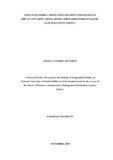EFFECTS OF MOBILE APPLICATION SECURITY STRATEGIES ON PRIVACY INVASION AMONG MOBILE SHOP OPERATORS IN NAKURU EAST SUB-COUNTY, KENYA
Abstract
Privacy invasion is an offence perpetrated by availability, access, and use of advanced mobile devices when they land in the wrong hands of people who have the intention of infringing into the space of either individuals or organizations. There have been many incidences of infringement on people‟s privacy by exposing their personal lives to third parties and the general public, a factor which is associated with detrimental effects. The study sought to integrate mobile application security strategies as a measure towards curbing privacy invasion. The general objective was to evaluate the effects of mobile application security strategies on privacy invasion among mobile shop operators in Nakuru East Sub-County, Kenya. The specific objectives were; to examine data encryption, advanced software testing techniques, risk analysis, and privacy settings on privacy invasion among mobile shop operators in Nakuru East Sub-County, Kenya. The study was guided by the technology acceptance model, restricted access or limited control theory of privacy, control theory of privacy, and seclusion theory of privacy. The study adopted a cross-sectional research design, and was carried out in Nakuru East Sub-County, Kenya. The units of observation were mobile shops within Nakuru town, while the units of analysis were operators of mobile shops. According to Nakuru East Sub-County Business Register (2019), there are 221 mobile shops within Nakuru town. The researcher used Purposive sampling method to select respondents (Operators) from each of the 221 mobile shops. Nassiuma‟s (2000) formula was used to determine the sample size of 70 operators of mobile shops. The study used structured questionnaires to facilitate data collection. The pilot study was conducted in Eldoret town‟s Central Business District where questionnaires were issued out to 7 selected operators of mobile shops. The collected data was analyzed with the aid of the Statistical Package for Social Sciences. Descriptive statistics encompassing frequencies, percentages, means and standard deviations were used in the analysis. In addition, inferential statistics such as correlation and multiple regression analysis were used. The results of the study revealed that there was a negative and statistically significant correlation between data encryption and privacy invasion of the mobile users in Nakuru town. The results of the study further revealed that there was a negative and statistically significant correlation between advanced software testing techniques and privacy invasion. The results of the correlation analysis further indicated that better risk analysis reduces cases of privacy invasion of mobile users in Nakuru town. The results of the study revealed that a strong negative correlation existed between Privacy setting and privacy invasion. From the findings the study recommended that mobile shop operators within Nakuru East Sub-County should adopt data encryption security strategy because it allows protection of data that they do not want anyone else to have access to. The study further recommended that mobile shop operators should adopt advanced software testing techniques because they provide stakeholders with information about the quality of the software product or service under test

